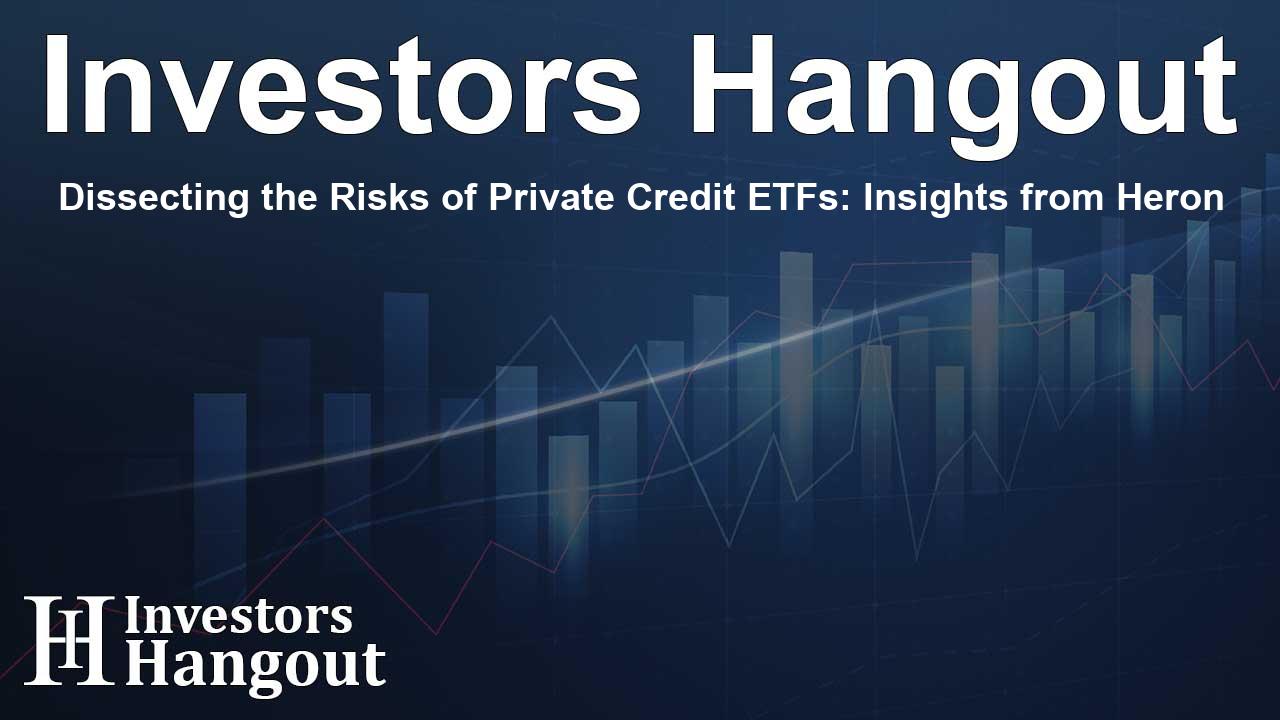Dissecting the Risks of Private Credit ETFs: Insights from Heron

Navigating the Risks of Private Credit ETFs
Private credit has become a hot topic in recent times, drawing the interest of many retail investors. However, careful consideration is vital before jumping into this investment realm. Heron Finance has identified key concerns regarding the convenience of private credit ETFs and interval funds, which may ultimately compromise transparency and performance for investors.
Concerns Raised by Heron Finance
Understanding the Spectrum of Private Credit
As the landscape of private credit investments expands, it's crucial to differentiate between what truly constitutes private credit and what does not. Heron Finance points out that various ETFs and interval funds branded as "private credit" often contain a blend of high-yield bonds, Treasuries, and equities. This dilution can significantly alter the expected risk-return profile, leaving investors with a portfolio that does not represent their intended allocation to private credit.
The Challenge of Diversification
Another important consideration is the issue of diversification. Many of these funds are managed by a single credit manager, comprising only that manager's investment opportunities. This lack of diversification increases concentration risk, which may not align with the expectations of retail investors and registered investment advisors who seek a more balanced exposure to private credit.
Customization Limitations
Furthermore, off-the-shelf private credit products often lack the flexibility required for tailoring investment portfolios to individual needs. Features such as monthly income, capital preservation, or lower volatility are crucial for many investors but may not be available with standard ETF or interval fund offerings.
Red Flags from Industry Experts
Heron Finance references alarm bells raised by industry authorities like Moody's and Morningstar, who have both indicated concern over the current state of retail private credit offerings.
Insights from Moody's
Moody's has expressed worries that the increasing competition for investment opportunities might compel fund managers to chase after lower-quality loans. This could jeopardize the quality of credit made available to investors, potentially leading to increased risk.
Morningstar's Warnings
Moreover, Morningstar has pointed out the risks associated with net asset value (NAV) mispricing and the pressure for redemptions. Such factors could impact the liquidity of ETFs and interval funds, resulting in them trading at significant discounts or forcing investors to incur premature losses.
An Alternative Approach to Private Credit Investing
In contrast to traditional ETFs and interval funds, Heron Finance positions itself as an independent and transparent solution for accredited investors. By utilizing a proprietary credit scoring system, Heron engages in rigorous monitoring of private credit managers. This ensures that clients receive only the highest-ranked funds in their portfolios.
Benefits of Heron Finance’s Approach
Heron's portfolios prioritize investments specifically in private credit assets, allowing for broader diversification across various industry sectors, market segments, and deal types. This tailored approach enables investors to customize their portfolios to fit their unique risk profiles and income requirements.
Conclusion: Making Informed Investment Decisions
As Khang Nguyen, Chief Credit Officer at Heron, emphasizes, "Private credit investing, especially in retail settings, requires more than simply bundling investments and presenting them as straightforward options." The preferences of investors vary widely; hence, maintaining control over their investment options has become essential.
With a focus on transparency, diversification, and customization, Heron Finance is dedicated to helping clients navigate the complexities of private credit. This approach ensures that investors can pursue their financial goals with clarity and confidence.
About Heron Finance
Heron Finance stands out as a private credit investment platform dedicated to serving accredited retail investors and registered investment advisors (RIAs). By crafting customized, diversified portfolios from institutional-level private credit funds, Heron provides clients with accessible income-generating assets while minimizing the complexities associated with traditional public market investment structures.
Media Contact
[Email Contact]
Frequently Asked Questions
What are private credit ETFs?
Private credit ETFs are investment funds that pool money to invest in private credit instruments, often marketed to retail investors.
Why should investors be cautious with private credit ETFs?
Investors should be wary due to potential transparency issues and a lack of true private credit exposure among many offerings.
How does Heron Finance differentiate itself?
Heron Finance focuses on transparency and active management, providing tailored portfolios based on rigorous monitoring of private credit managers.
What risks do Moody's and Morningstar highlight regarding private credit?
Both agencies warn about the potential for declining loan quality and challenges related to liquidity and NAV mispricing.
What is the importance of portfolio customization in private credit investing?
Customization allows investors to align their portfolios with personal financial goals such as income requirements and risk tolerance.
About The Author
Contact Dylan Bailey privately here. Or send an email with ATTN: Dylan Bailey as the subject to contact@investorshangout.com.
About Investors Hangout
Investors Hangout is a leading online stock forum for financial discussion and learning, offering a wide range of free tools and resources. It draws in traders of all levels, who exchange market knowledge, investigate trading tactics, and keep an eye on industry developments in real time. Featuring financial articles, stock message boards, quotes, charts, company profiles, and live news updates. Through cooperative learning and a wealth of informational resources, it helps users from novices creating their first portfolios to experts honing their techniques. Join Investors Hangout today: https://investorshangout.com/
The content of this article is based on factual, publicly available information and does not represent legal, financial, or investment advice. Investors Hangout does not offer financial advice, and the author is not a licensed financial advisor. Consult a qualified advisor before making any financial or investment decisions based on this article. This article should not be considered advice to purchase, sell, or hold any securities or other investments. If any of the material provided here is inaccurate, please contact us for corrections.
